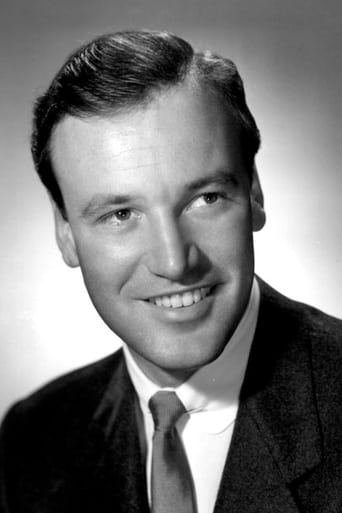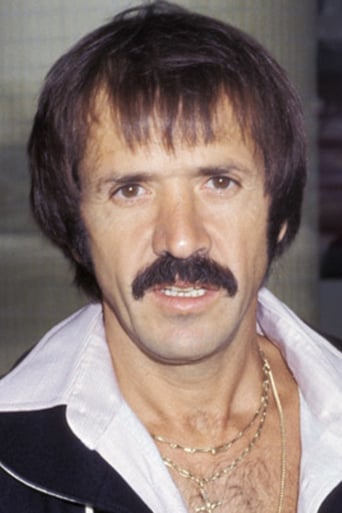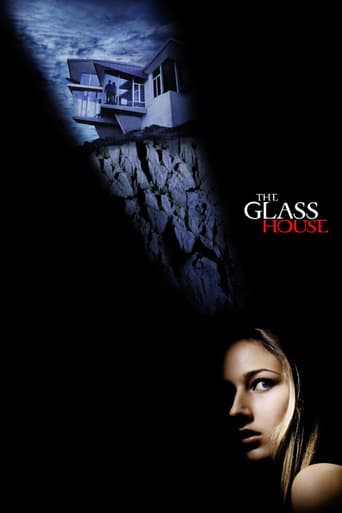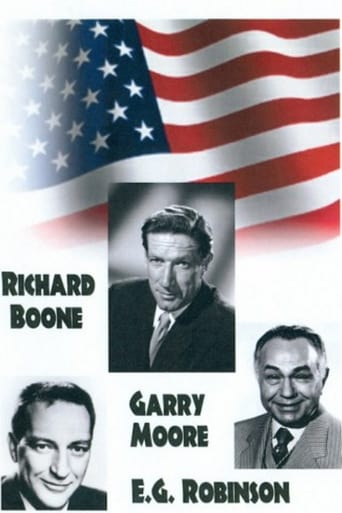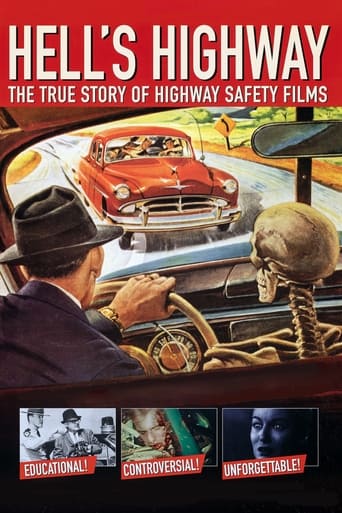

Hell's Highway: The True Story of Highway Safety Films (2003)
This film covers the early history of post World War II educational films, especially those involving traffic safety by the Highway Safety Foundation under direction of Richard Wayman. In the name of promoting safe driving in teenagers, these films became notorious for their gory depiction of accidents to shock their audiences to make their point. The film also covers the role of safety films of this era, their effect on North American teenage culture, the struggle between idealism and lurid exploitation and how they reflected the larger society concerns of the time that adults projected onto their youth.
Watch Trailer
Cast
Similar titles


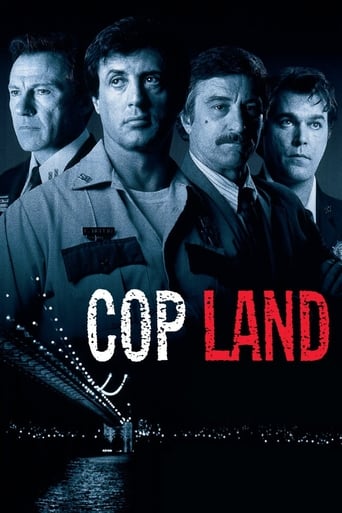



Reviews
Good story, Not enough for a whole film
From my favorite movies..
A Disappointing Continuation
Like the great film, it's made with a great deal of visible affection both in front of and behind the camera.
Hell's Highway: True Story of Highway Safety Films (2003) ** (out of 4)Pretty disappointing documentary taking a look at the Highway Safety Films of the 60s and 70s. I was really looking forward to this thing but nothing really worked out too well. The interviews were rather boring, which is what really killed this. The film picks up in the final fifteen-minutes when we hear debates on whether these films did any good or not. I personally found the actual videos to be nothing more than offensive, tasteless scare tactics. Footage included one film where cops flips over a car to discover a dead baby that has been smashed to death. There are countless other bloody clips where people's heads are stuck through windshields and so on.
For just about anyone who took a driver's ed course in the sixties and seventies, those grisly highway safety films were usually the first exposure to the horrible truth about human mortality. For me, it was a little opus called "Death on the Highway". In my high school, you heard accounts of just what was in that film long before you finally got to see it. I saw it when I was seventeen, before I ever saw "Faces of Death 1", rotten.com, the footage of Budd Dwyer blowing his brains out, or the actual suicide of an unemployed dishwasher who jumped from the roof of a twelve-story building on a summer afternoon in 1986. "Hell's Highway" contains excerpts from "Death on The Highway", including the unforgettable image of two dead toddlers lying side by side, one with an arm severed. I've carried that image with me for thirty years, and when I saw it again in "Hell's Highway", I discovered that it hadn't altered a jot in my memory.What makes "Hell's Highway: The True Story of Highway Safety Films" so very satisfying as a documentary is that it strives to cover its fascinating and obscure topic from every possible perspective. Therefore we have interview footage of John Butler, retired Chief of Police of Mansfield, Ohio, Earl Deems, who produced several of these 16mm traumafests, and Mike Vraney, head honcho at "Something Weird Video" who now markets these films to the morbidly curious. Everyone who speaks in this movie speaks intelligently, and is portrayed respectfully. No one is satirized or treated condescendingly. Part social history, part memoir, part critique, "Hell's Highway" focuses mainly on a company called Highway Safety Films, the film-making arm of the Highway safety Commision, which operated out of Mansfield from 1959 to 1979, and produced "Signal 30", "Mechanized Death", "Wheels of Tragedy", and "Highway Of Agony", among others.Many of the interview subjects discuss whether showing grisly footage of bloody corpses being pulled from car wrecks to teenage kids actually made them safer drivers. To my way of thinking, it can't be proved either way, and the rule of "you can lead a horse to water, but the rule of "you can lead a horse to water but you can't make him drink" applies here. In other words, it would be irresponsible for educators not to try to make every effort to impress upon young drivers the consequences of reckless driving. What they do with the knowledge is not under the educator's control or responsibility.The version of this film that I found in my Public Library came with a bonus DVD containing uncut versions of three of the best-known productions of the Highway Safety commission's short subjects. Personally, I think that watching these things still have the power to make the viewer want to pay attention to every last stop sign.
A great idea,but a rather shaky production.Great interviews with members of the Foundation,and video archivists.They missed the chance to possibly interview those who appeared in the films (as victims) and those who recreated scenes in their films (like Wheels of Tragedy).But overall,thank goodness this genre has been given a new voice.Kids today laugh at death and blood.Society has felt it better to shield kids from the reality of death and agony rather than shock them/damage them,with the truth.Death isn't pretty,but its reality.Many thousands die every year,and millions are injured....what better subject to showcase than the fact that car crashes kill and maim American lives.For those who feel that sacraficing even one soldier in Iraq or Afganistan is wrong,just stop and think....how many Americans die in just ONE day on our roads? And nothing our "mighty" SUVs,pickups,semis,muscle cars or exotic imports can prevent.People die in EVERY vehicle,in every state and in every town.And over time,in every street.Think about that next time you tool around town talking on the cell phone or adjusting your radio knob.Take the advice these films were meant to give...think,use your head,and fear for your life.You will be a much safer driver as a result.
"Hell's Highway" is a documentary focusing on the men who created the now-infamous highway safety films of the mid-twentieth century, in particular those involved with the Highway Safety Foundation (HSF) during its life as a procurer of the macabre as an educational tool. The film's director, Bret Wood, manages to capture the audience's interest without ever guiding their thoughts or beliefs towards a discernible argument or standpoint. We as an audience are never led to think or feel in a certain way about the film's subject, a characteristic that will be lauded by some and looked down upon by others. While the neutral position taken by Wood may seem like a noble endeavor, it unfortunately causes the documentary to be hollow at its center, and the viewer is left to feel that the only reason he or she is watching it is to see the usually shocking safety films contained within. Doc lovers will probably recognize the lack of form that this hollowness forces upon the film, causing it to not live up to expectations, while the casual viewer may find greater entertainment value in it, but will more than likely still recognize the empty space at the film's core.Another flaw of this film is its over-reliance on clips from the actual highway safety films produced by the HSF and its lack of supporting evidence and arguments from interviews. The interviewees seem like they have a lot to say, but are never given the opportunity to fully express their ideas and thoughts behind the making of the safety films. Instead, Wood inserts usually the most shocking scenes from the films being mentioned for sheer entertainment purposes, as if he were afraid that the audience would lose interest in the doc's subject matter.In addition to this, the film suffers from being overly-long and drawn out. At a running time of approximately ninety minutes, this film sets out to stretch a subject a little too thinly over a lengthy period of time. It is more than likely due to Wood's hesitance to take a stance on his subject that causes the film to seem extended beyond its limits. One cannot help but wondering what the film would be like if it followed a more rhetorical or dramatic arc, rather than focusing on interview footage that has a tendency to beat around the bush, so to speak. The film's final third suffers the most from this forced extension of time and topic as it skews into mentioning the other safety films produced by the HSF as it began to expand that had little or nothing to do with automobile accidents or cautions. The section on the HSF's rumored involvement with pornographic films seems like a complete digression and an ignorance of the doc's central idea and topic. And while the safety films dealing with shoplifters, child molesters, and the like are interesting in their own right, their presence in the film as a whole seems awkward and out of place.Overall, this is an interesting film dealing with an extremely interesting subject. Its untraditional and neutral approach to its subject is a detriment, though, as is its overly-long running time. As a documentary, it succeeds on some levels but fails on more, but as an opportunity to see some of the most shocking and amazing highway safety films ever produced, it will definitely not disappoint.
